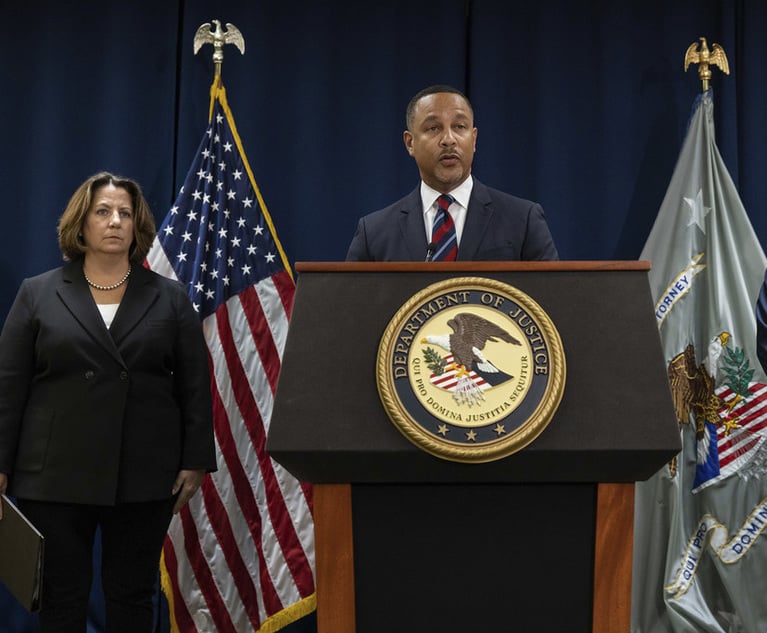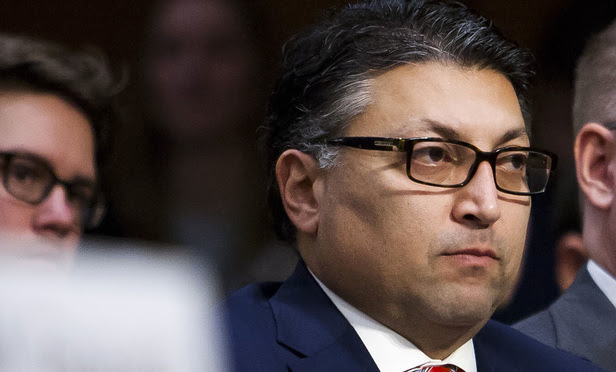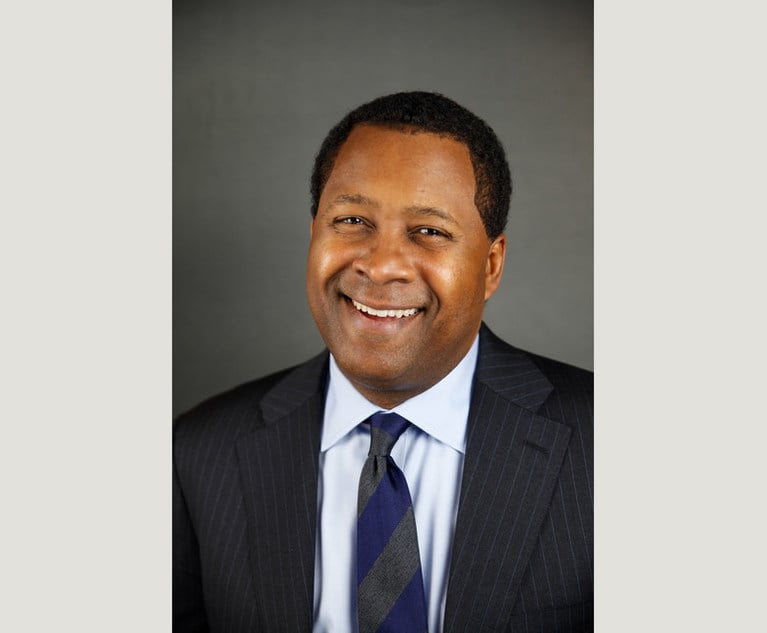Compliance Hot Spots: Who's Mad About the SEC's Proposed Whistleblower Changes? | DOJ Wants to Shorten Merger Reviews | Who Got the Work & Much More
The US Securities and Exchange Commission is weighing proposed changes to the agency's whistleblower program—here's some of the early commentary. Plus: DOJ eyes reducing merger-review times, and scroll down for Who Got the Work. Thanks for reading Compliance Hot Spots.
September 25, 2018 at 09:00 PM
10 minute read
Welcome to Compliance Hot Spots, our briefing on compliance, enforcement and government affairs. The SEC is weighing changes to the agency's whistleblower program—we've got a snapshot of some of the earlier business community and plaintiffs commentary. Plus: the U.S. Justice Department wants to shorten merger reviews—see what's driving Makan Delrahim's push. Scroll down for some of the big new moves and our regular feature Who Got the Work.
As always thanks for reading—and please do send feedback. I appreciate hearing from you about what's on your plate—observations, trends, new clients. I'm at [email protected] and 202-828-0315, or follow me on Twitter @cryanbarber.
'A Gift to the Major Investment Banks'
After blowing the whistle on Bernie Madoff's Ponzi scheme, the forensic accountant Harry Markopolos finally got a message through to Washington: Regulators needed a program for accepting tips and rewarding those who give them.
A decade after Markopolos made that appeal to Congress, the U.S. Securities and Exchange Commission has awarded nearly $330 million to whistleblowers who've helped with successful enforcement actions, along the way winning admirers from both sides of the political aisle. The latest award came Monday: An almost $4 million bounty to an overseas whistleblower whose tip led the SEC to open an investigation.
>> So when the SEC proposed tweaks to the program, supporters asked: If it ain't broke, why “fix” it?
As I recently reported, Markopolos is not a fan of the proposed changes, including a provision that would allow commissioners to lower the very highest awards. That provision, allowing the SEC to lower awards to $30 million when whistleblowers would otherwise qualify for a bigger bounty, “would be a gift to the major investment banks and other large public companies, as it would deter high-ranking officers at those entities from turning whistleblower,” he wrote in a comment letter.
>> Markopolos is not alone in his disfavor. Even the U.S. Chamber of Commerce opposed the idea of giving the SEC the power to lower the largest of the large awards. (Here's a full list of all the comments that came in by the Sept. 18 deadline.)
The Chamber, which has long criticized the whistleblower program for undercutting internal compliance programs, said in a comment letter that it saw “no reason why collecting monetary sanctions above $100 million (itself an arbitrary number) should alter the criteria for payment to a bounty seeker or otherwise provide any kind of floor.”
“Additionally, in order to incentivize the use of internal compliance systems, the SEC should also consider imposing a significant discount on any award in which a whistleblower does not make a report to the company involved at the same time they report to the SEC,” wrote Tom Quaadman, executive vice president of the chamber's Center for Capital Markets Competitiveness.
Meanwhile, the plaintiffs firm Cohen Milstein Sellers & Toll, which represents whistleblowers, said in a comment letter that proposed changes “would have the unintended consequence of undermining the Whistleblower Program by discouraging individuals from reporting information to the commission and unduly denying awards to whistleblowers who provide useful information.”
U.S. Sen. Chuck Grassley, a whistleblower proponent, wrote a comment letter that took issue with the SEC's proposal to allow the commissioners to lower especially high awards. Under the program's rules, whistleblowers are entitled to between 10 and 30 percent of sanctions from enforcement actions—but the proposal would give commissioners the discretion to reduce bounties to $30 million in cases where the formula would otherwise lead to a larger award.
Grassley said the proposal would effectively set an “arbitrary cap” on awards.
“It says that whistleblowers who provide information that results in very, very successful cases and who otherwise could receive a much larger award based on their assistance likely will have their potential awards docked for reasons that have nothing to do with the value of the whistleblower's information or the whistleblower's behavior,” Grassley wrote.
Reading Room: DOJ Wants Shorter Merger Reviews | Numbers Game at SEC | Google Grapples With Censorship Claims
Makan Delrahim, the Justice Department's top antitrust enforcer, is promising faster merger reviews—aiming to resolve most evaluations within six months. “Unduly long” reviews, Delrahim (above) said Tuesday in remarks, “waste public and private resources.” He added: “Certainly everyone in the business community who has received a second request, and everyone in the private bar who has worked on one, understands how burdensome compliance can be. We always want to minimize that burden consistent with upholding the antitrust laws.” Delrahim said there are no winners with long reviews “other than lawyers and expert economists, perhaps.” The WSJ has more here.
Some other stories that caught my eye…
>> Numbers—”standing alone”—are no way to judge an enforcement program, said the SEC's co-director of enforcement, Stephanie Avakian. In a recent speech, Avakian rejected the notion that a drop in total fines or number of cases meant the SEC was easing up at all in its enforcement efforts. Total fines ordered through SEC enforcement activity fell 7.2 percent last year to about $3.8 billion, the lowest total since 2013, according to SEC figures. “Any assessment that suggests our effectiveness should be measured solely based on the number of cases we bring over any particular period of time is misguided,” Avakian said. [WSJ]
>> “We do not bias our products to favor any political agenda. The trust our users place in us is our greatest asset and we must always protect it.” That was Google CEO Sundar Pichai in an email to staff, refuting claims that the company suppresses conservative news outlets in search results. Just days later, on Tuesday, U.S. Attorney General Jeff Sessions met with 24 state attorneys general to discuss complaints that Google, Facebook and other internet companies are suppressing conservative views. Pichai plans to meet with lawmakers this week—meetings, he said, that “will continue Google's long history of engaging with Congress, including testifying seven times to Congress this year.”
>> Financial regulators made much ado this month about a jointly issued statement clarifying that staff guidance does not carry the force of law. On its face, the announcement appeared to be a welcome development for the financial industry, stating that enforcement actions cannot be taken solely based on supervisory guidance. But it appears to have been met with a shrug inside King & Spalding. In a client alert this week, the firm had this to say about the relief—or lack thereof—that will come from the interagency statement: “[Only a blurry line separates the bringing of an enforcement action based on a 'violation' of a guidance—which is improper, since guidance is not law—and from the bringing of an enforcement action based on a violation of a statute or regulation as interpreted in a guidance. As a result, despite the recent statements, supervised entities may essentially be required to follow supervisory guidance even if the guidance itself is not couched as legally binding.”
>> Two years after Och-Ziff's paid more than $400 million to resolve a foreign bribery investigation, the hedge fund is still dealing with collateral consequences. A securities fraud lawsuit alleging that Och-Ziff failed to make adequate disclosures of the investigation was recently certified as a class action, prompting the hedge fund to notify a federal judge in New York that it had reached an agreement in principle to settle the case. “At a high level, the Och-Ziff case is a reminder of the potential collateral consequences of FCPA investigations,” a team from Cleary Gottlieb Steen & Hamilton wrote.
Who Got the Work
>> White-collar partner Jonathan Kolodner at Cleary Gottlieb represented the former CEO of the Chilean-based chemical and mining company Sociedad Química y Minera de Chile, S.A. in a $125,000 SEC foreign-bribery settlement. Read the SEC order here.
>> K&L Gates partner Phoebe Winder in Boston was counsel to Citibank N.A. in a $5 million U.S. Justice Department settlement over robo-signing claims in consumer bankruptcy case that involved thousands of Macy's credit card accounts. My colleague Sue Reisinger has more here on the deal's specific instructions for Citibank's compliance staff. >> Foley Hoag partner Paul Kim in Washington has registered to lobby for Korea-based Medytox on the regulation of biological products. Medytox manufactures biopharmaceuticals. Kim has lobbied for some of the country's biggest pharma companies, including Sanofi, Gilead Sciences and Baxter.
The Big Moves, Promotions & More
>> Google's named its longtime privacy lawyer, Keith Enright, as chief privacy officer, according to Bloomberg. Enright is expected to testify Wednesday with other tech executives in the U.S. Senate about consumer privacy. Among the panelists: Len Cali, senior vice president for global public policy at AT&T Inc.; Andrew DeVore, vice president and associate general counsel at Amazon.com Inc.; and Damien Kieran, global data protection officer and associate legal director at Twitter Inc.
>> Former O'Melveny & Myers partner Brian Brooks is heading to the cryptocurrency exchange Coinbase, where he'll serve as chief legal officer. Brooks was most recently executive vice president, general counsel and corporate secretary of Fannie Mae, the U.S. mortgage finance company. “His arrival is part of our effort to expand our legal, compliance and government affairs capabilities as we head into this next chapter for the company and the cryptocurrency industry as a whole,” Coinbase CEO Brian Armstrong said in a blog post.
>> Richard Levine is joining Labaton Sucharow in Washington from the U.S. Securities and Exchange Commission, where he was an associate counsel. Levine, a former longtime associate general counsel for legal policy at the SEC, will represent whistleblowers in front of the agency in his new role as a partner at Labaton.
>> Gabriel Hidalgo, the former chief compliance officer for Noble Bank International, is joining K2 Intelligence as a managing director in the regulatory compliance practice. Hidalgo will lead the cryptocurrencies and digital asset services team, with a focus on helping clients comply with rules against money laundering.
>> Nancy Libin, who led the data privacy and cybersecurity practice at Jenner & Block, has left the firm to join Davis Wright Tremaine as a co-chair of the firm's technology and privacy and security practice in Washington. She's replacing Christin McMeley, a current leader of the practice group, who is leaving the firm in October for Comcast. Before joining Jenner, Libin served as the chief privacy and civil liberties officer at the Justice Department from June 2009 to August 2012.
That's all for this week. Thanks for reading Compliance Hot Spots. We love feedback—suggestions, tips or just say hi. I'm at [email protected] and 202-828-0315, or follow me on Twitter @cryanbarber.
This content has been archived. It is available through our partners, LexisNexis® and Bloomberg Law.
To view this content, please continue to their sites.
Not a Lexis Subscriber?
Subscribe Now
Not a Bloomberg Law Subscriber?
Subscribe Now
NOT FOR REPRINT
© 2025 ALM Global, LLC, All Rights Reserved. Request academic re-use from www.copyright.com. All other uses, submit a request to [email protected]. For more information visit Asset & Logo Licensing.
You Might Like
View All
Compliance Hot Spots: GOP Eyes ESG as an Antitrust Issue + Another DOJ Crypto Seizure + Sidley Partner Jumps to Main Justice
9 minute read
Compliance Hot Spots: Lessons from Lafarge + Fraud Section Chief Talks Compliance + Cravath Lands FTC Commissioner
11 minute readTrending Stories
- 1'It's Not Going to Be Pretty': PayPal, Capital One Face Novel Class Actions Over 'Poaching' Commissions Owed Influencers
- 211th Circuit Rejects Trump's Emergency Request as DOJ Prepares to Release Special Counsel's Final Report
- 3Supreme Court Takes Up Challenge to ACA Task Force
- 4'Tragedy of Unspeakable Proportions:' Could Edison, DWP, Face Lawsuits Over LA Wildfires?
- 5Meta Pulls Plug on DEI Programs
Who Got The Work
Michael G. Bongiorno, Andrew Scott Dulberg and Elizabeth E. Driscoll from Wilmer Cutler Pickering Hale and Dorr have stepped in to represent Symbotic Inc., an A.I.-enabled technology platform that focuses on increasing supply chain efficiency, and other defendants in a pending shareholder derivative lawsuit. The case, filed Oct. 2 in Massachusetts District Court by the Brown Law Firm on behalf of Stephen Austen, accuses certain officers and directors of misleading investors in regard to Symbotic's potential for margin growth by failing to disclose that the company was not equipped to timely deploy its systems or manage expenses through project delays. The case, assigned to U.S. District Judge Nathaniel M. Gorton, is 1:24-cv-12522, Austen v. Cohen et al.
Who Got The Work
Edmund Polubinski and Marie Killmond of Davis Polk & Wardwell have entered appearances for data platform software development company MongoDB and other defendants in a pending shareholder derivative lawsuit. The action, filed Oct. 7 in New York Southern District Court by the Brown Law Firm, accuses the company's directors and/or officers of falsely expressing confidence in the company’s restructuring of its sales incentive plan and downplaying the severity of decreases in its upfront commitments. The case is 1:24-cv-07594, Roy v. Ittycheria et al.
Who Got The Work
Amy O. Bruchs and Kurt F. Ellison of Michael Best & Friedrich have entered appearances for Epic Systems Corp. in a pending employment discrimination lawsuit. The suit was filed Sept. 7 in Wisconsin Western District Court by Levine Eisberner LLC and Siri & Glimstad on behalf of a project manager who claims that he was wrongfully terminated after applying for a religious exemption to the defendant's COVID-19 vaccine mandate. The case, assigned to U.S. Magistrate Judge Anita Marie Boor, is 3:24-cv-00630, Secker, Nathan v. Epic Systems Corporation.
Who Got The Work
David X. Sullivan, Thomas J. Finn and Gregory A. Hall from McCarter & English have entered appearances for Sunrun Installation Services in a pending civil rights lawsuit. The complaint was filed Sept. 4 in Connecticut District Court by attorney Robert M. Berke on behalf of former employee George Edward Steins, who was arrested and charged with employing an unregistered home improvement salesperson. The complaint alleges that had Sunrun informed the Connecticut Department of Consumer Protection that the plaintiff's employment had ended in 2017 and that he no longer held Sunrun's home improvement contractor license, he would not have been hit with charges, which were dismissed in May 2024. The case, assigned to U.S. District Judge Jeffrey A. Meyer, is 3:24-cv-01423, Steins v. Sunrun, Inc. et al.
Who Got The Work
Greenberg Traurig shareholder Joshua L. Raskin has entered an appearance for boohoo.com UK Ltd. in a pending patent infringement lawsuit. The suit, filed Sept. 3 in Texas Eastern District Court by Rozier Hardt McDonough on behalf of Alto Dynamics, asserts five patents related to an online shopping platform. The case, assigned to U.S. District Judge Rodney Gilstrap, is 2:24-cv-00719, Alto Dynamics, LLC v. boohoo.com UK Limited.
Featured Firms
Law Offices of Gary Martin Hays & Associates, P.C.
(470) 294-1674
Law Offices of Mark E. Salomone
(857) 444-6468
Smith & Hassler
(713) 739-1250













